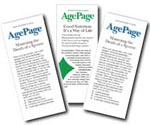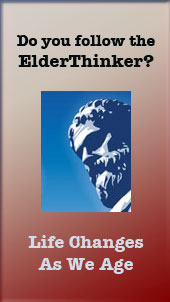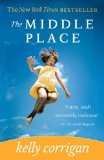Older Adults And Cancer
Cancer In Later Life
MacMillan Cancer Support
Older people today are generally both mentally and physically fitter than previous generations, and many retired people enjoy a new lease of life. Being diagnosed with cancer at this time can therefore seem very unfair, as it could affect many aspects of your life and may interfere with your quality of life. However, it is important to remember that many people are cured and others manage to maintain a virtually normal life while living with their cancer.
Older people sometimes find that they are able to cope better with the diagnosis than younger people, as they have had more experience of coping with difficult times. This ability to cope, coupled with the better health people have these days, is very important in improving the quality of life for people who are cured of cancer, and in extending the length of life for people who cannot be cured. >>More
Questions To Ask Your MD about cancer
American Geriatrics Society (AGS)
According to the American Geriatrics Society (AGS), there are several good questions to ask your doctor. Be prepared to listen and if possible take someone with you. Here's what the AGS says:
"Normal cells grow and multiply according to their genetic programming. Over time, genetic damage can occur that causes a cell to grow abnormally. Sometimes, this process is not harmful, producing a benign tumor that grows slowly, much like a skin wart. Other times, cells grow out of control, invading nearby tissues or other parts of the body. This type of malignant growth is commonly referred to as cancer. The medical study of cancer and its treatment is called oncology. Physicians who specialize in oncology are called oncologists." There are several good questions to ask your doctor. >>More
Information & Resources About Cancer
The National Foundation for Cancer Research provides a free treatment option tool. Online NCFR provides:
A list of treatment options and possible side effects tailored to your specific clinical status >>More
Reports including the pros and cons of each type of treatment >>More
Questions to ask your doctor >>More
Age Pages from the National Institute on Aging

These useful booklets include:
- Cancer Facts for People Over 50 >>Download
- Prostate Problems >>Download
- Skin Care and Aging >>Download
- Smoking: It's Never Too Late to Stop >>Download
Stories of hope. Find inspiration, hope, and support in these stories about other people whose lives have been touched by cancer. >>More
Cancer.net - American Society of Clinical Oncology
Facts and information especially about older persons who have cancer, or who cares for someone who does. >>More
From the UK: Help The Aged
Here's what the British have to say on this very useful site:
"Health problems can be very intimidating and cancer is possibly the biggest taboo of all, but the fact is the earlier you are treated the better your chance of making a full recovery. Try not to put changes down to 'just my age' or worse, to ignore them completely.
"You are never too old to be treated for any condition and that includes treatment for cancer." >>More
National Cancer Institute
The National Cancer Institute offers a very valuable information service with many resources and advice pages. Examples include "How to Find Resources In Your Own Community," and "Life After Cancer Treatment." >>More










